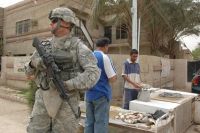FORT RILEY, Kan. — A decade ago, then-paramedic Peter Rosie was on his day off hanging around his apartment in New York City.
Rosie was in his eighth year with the New York City Fire Department, where he served the residents of the Harlem community. A phone call from his girlfriend instructing him to turn on the television caused Rosie to spring into action.
“I saw the first plane hit [the North Tower] on the TV. We had a small TV so you couldn’t make out the magnitude of it,” Rosie recalled. “All I had to do was walk one flight to the roof, and then I saw the second [plane] hit in front of me. My first thought was, ‘I better go to work.’ ”
Today Rosie is an Army staff sergeant serving here with the 1st Infantry Division’s 1st Battalion, 4th Cavalry Regiment. On Sept. 11, 2001, he experienced the horror of the terrorist attacks on the World Trade Center’s Twin Towers.
Rosie is native of Scotland who’d previously served in the U.S. Army and later with the British Army before joining the New York City Fire Department. On 9/11, he hopped on his son’s bicycle to report to Bellevue Hospital Center. Throughout the following Weeks, the facility would be one of New York’s busiest centers to treat the wounded and later assist with identifying the deceased.
Within 10 minutes Rosie was handed a two-way radio and assigned to a partner and an ambulance for assistance at the World Trade Center.
“They threw a radio at me and said ‘Here’s your partner’ and we started going down [to the WTC],” he said. “All I knew was it was bad.”
He would soon be a first-hand witness to the sheer magnitude and danger of the day’s tragic events when his ambulance began to arrive on the scene just as the South Tower [the first of the two towers to collapse] began to fall and nearly struck his vehicle.
“We were driving into it as it was coming down. We’re talking seconds,” he said “If we had been a little bit earlier — goner. Then, it just went black.”
Rosie recalled that the closer they traveled to what is now known as “ground zero,” the harder it became to keep their bearings due to the amount of smoke and falling debris. The first patients he assisted included a police officer suffering from a heart attack and another person who’d lost a limb.
“It was that first transport that was the worst,” he said. “We backed up into Bellevue and there’s just a sea of scrubs, just people waiting.”
When Rosie returned to the site, the second tower had also collapsed and he recalled how first responders were still attempting to establish a command post and a means of communications between emergency personnel.
“By that point, no one knew what was going on,” he said. “We were hearing and getting all kinds of information. At one point we thought the Holland Tunnel was blown up.”
Rosie recalls he functioned on “auto-pilot” the rest of the day and ensuing night, with numerous patient transports to the hospital and treating patients’ respiratory distress and eye injuries.
He recalled that smoke would continue to rise from the site for weeks and by then emergency crews had switched from rescue missions to recovery missions to retrieve the deceased from the debris.
For the following year when Rosie wasn’t on his scheduled shift at the fire department, he would be found volunteering for recovery missions at ground zero.
“For the next year if I wasn’t working at Harlem, then I was working down at ground zero,” he said. “There was a lot of camaraderie. It was good, but tiring.”
There were 343 New York City firefighters who’d lost their lives on 9/11, Rosie said. His experiences during 9/11 in New York City caused Rosie to eventually rejoin the U.S. military.
“I knew that everything had changed,” Rosie said, “and I wanted to go back into the Army.”
Unfortunately, Rosie’s age was working against him. He was over the Army’s maximum enlistment age. However, as though fate granted his wish, the policy was temporarily changed. Rosie again donned a U.S. Army uniform after nearly 26 years.
“I guess they were getting hard up and taking old men,” he chuckled. Four years later, Rosie finds himself assigned to the historic ‘Big Red One’ here, preparing to embark on his third deployment with the 4th Infantry Brigade Combat Team.
“I thought I had bit off a little more than I could chew initially. But I persisted and I ended up doing real well,” Rosie said of his success in achieving the rank of staff sergeant after returning to the Army as a specialist.
Rosie visited New York this July. The trip, he said, marked the first time he’d returned to the city since re-enlisting in the Army.
“I don’t think about Sept. 11 too much,” he said. “I’m not sure if it’s some sort of coping mechanism, but I think it’s why I never went back to New York [before].”
Source:
U.S. Department of Defense
Office of the Assistant Secretary of Defense (Public Affairs)

 von
von 